Business
Lafarge Africa’s Profitability Dips Amid Economic Challenges
Published
on
at
6:16 PM
For the first time in six years, Lafarge Africa Plc has experienced a decline in earnings, with the company’s profits for 2023 falling to N51.4 billion.
This downturn marks a significant shift for the cement manufacturer, which had maintained a steady growth trajectory even through the disruptive pandemic lockdowns that impacted many businesses across various sectors.
The company’s unaudited financial statements for the year highlighted a significant increase in tax liabilities as a primary factor affecting its bottom line. Accrued tax obligations soared to N23.6 billion in 2023, marking an 86.9% increase from previous years. This surge in tax liabilities significantly impacted the company’s profitability.
Despite the challenges, Lafarge Africa reported a revenue increase of 8.6% to N405.5 billion, driven by higher income from the sales of aggregate, concrete, and cement. The recent spike in cement prices, which prompted a response from President Bola Tinubu in the form of an intervention meeting with major producers like Dangote Cement and BUA Cement, also played a role in revenue growth. This price increase comes amid a national emergency that has exacerbated the country’s cost of living crisis.
Lolu Alade-Akinyemi, CEO of Lafarge Africa, cited foreign exchange devaluation losses and a higher effective tax rate as key factors behind the 4.7% year-on-year decline in Profit After Tax. “Our performance was largely impacted by spiralling inflation and unprecedented Naira devaluation, with the attendant pressure on energy and supply chain costs,” he explained. The company also faced over N21 billion in foreign exchange losses, an increase from N16 billion the previous year.
In a bid to manage costs more effectively, Lafarge Africa reduced its selling & distribution costs to N78.1 billion, demonstrating notable efficiency in managing distribution variable costs, which were cut by 11.8%. This strategy contributed to a 15.3% increase in Profit Before Tax for the year.
However, the independent auditor Ernst & Young (E&Y) identified a significant concern with Lafarge Africa’s management, noting an “outrageous provision” of N5.5 billion for the deterioration of a substantial volume of ‘off-spec’ clinker. This issue, attributed to power fluctuations and other production process factors, was flagged as a key audit matter due to the substantial judgment exercised by management in determining the allowance.
This financial downturn for Lafarge Africa highlights the broader economic pressures facing businesses in Nigeria, including inflation, currency devaluation, and rising operational costs. As the company navigates these challenges, its strategies for managing costs and diversifying revenue streams will be crucial for future profitability and growth.
You may like
-


Again, Top Construction Firm To Exit Nigeria, Sells 83% Stake To Chinese Company
-


Lafarge Speaks On Crashing Current Price Of Cement To Former Rate
-


Manufacturers Agree To Drop Cement Price To N7000
-


Apply Here: Lafarge Announces Programme For Secondary School Leavers
-


COVID-19: Buhari Govt Releases N620m To Tackle Coronavirus
-


Coronavirus: Italian Man Recovers, May Be Discharged Soon – Governor
